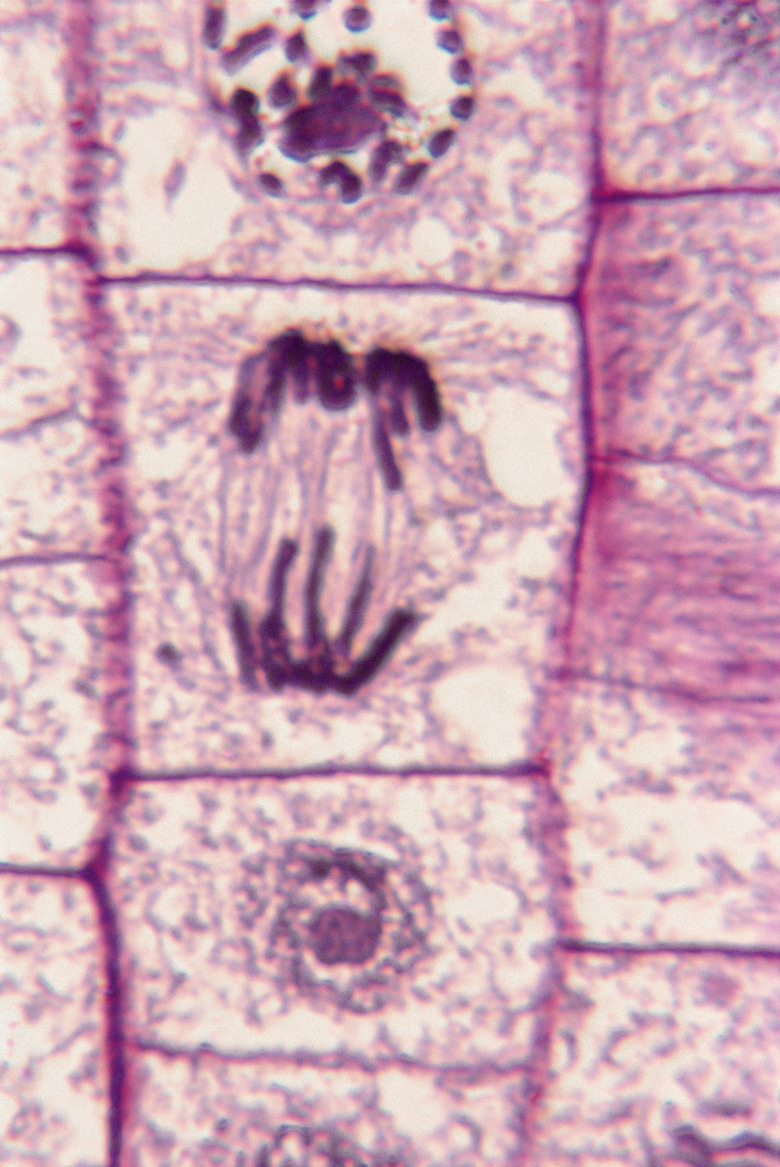How Does Mitosis Affect Life?
Regeneration of eukaryotic (nucleated) cells through mitosis empowers eukaryotic organisms like plants and animals to mature, grow larger, fight disease and heal damaged tissue.
Short-lived blood cells, skin cells, hair cells, gut cells and damaged cells must replenish themselves for the organism to stay alive and reproduce through meiosis. A few curious species with undifferentiated stem cells can make missing body parts through mitosis.
For instance, a starfish may regrow a missing arm after escaping an attack by a hungry crab.
TL;DR (Too Long; Didn't Read)
Mitosis affects life by directing the growth and repair of trillions of cells in the human body. Without mitosis, cell tissue would rapidly deteriorate and stop working properly.
What Happens in Mitosis?
What Happens in Mitosis?
Most cell division happening in living organisms occurs in somatic (non-reproductive) cells where genetic material in "parent" cells gets copied in a precise and orderly way. Human somatic cells possess 46 chromosomes; two pairs of 23 chromosomes inherited from each parent. Two new cells with the exact same genome emerge in the last stage of mitosis.
Neither gene shuffling nor sexual reproduction occurs in mitosis. The goal is perfect duplication without mistakes. The cell cycle happens in stages, commonly described as interphase, mitosis and cytokinesis; mitosis itself consists of stages labeled prophase, metaphase, anaphase and telophase (many sources add a stage between prophase and metaphase called prometaphase):
- **Interphase:** Nuclear DNA is copied in preparation for cell division.
- **Prophase:** Long chromosomes in the nucleolus condense to make it easier for them to be pulled apart during division. The nuclear membrane starts to disappear.
- **Metaphase:** Chromosome pairs line up in the middle of the
cell held in place by the spindle apparatus (animals) or microtubules (plants).
- **Anaphase:** Chromosome pairs separate, and then they are pulled by protein molecules to opposite poles of the cell.
- **Telophase:** A nuclear membrane reforms to encapsulate DNA
material in the chromatids of the two new cells.
- **Cytokinesis:** Plant cells separate by forming a cell plate. In animal cells, the
membrane of the cell pinches together, creating two daughter cells.
Mitosis and Wound Healing
Mitosis and Wound Healing
Mitosis and wound healing help living organisms rebound from injuries.
For instance, active children are prone to skinned knees and elbows. Thanks to mitosis, injuries quickly heal with little to no scarring. When skin is scraped, adjacent cells start multiplying and keep going until the cut is healed over nicely.
Mitosis and Meiosis
Mitosis and Meiosis
Both mitosis and meiosis occur in cells of plants and animals. Mitosis involves systematic splitting of a "parent" cell into twin "daughter" cells, each containing identical DNA in sets of "sister" chromatids. Given that there are trillions of cells in the human body, mitosis is ongoing, especially in cells that need constant renewal like skin cells exposed to the elements.
Meiosis is a process of sexual reproduction that produces new gene combinations, which differs from mitosis, itself an asexual process of cell division. Meiosis occurs in reproductive plant and animal cells like spores, sperm and egg cells. Meiosis supports biodiversity within the species.
When biodiversity is limited, a population may be driven to the brink of extinction by new diseases or changing environmental conditions.
What if Mitosis Goes Wrong?
What if Mitosis Goes Wrong?
Mitosis is an intricate dance precisely choreographed by enzymes and proteins that direct chromosome movement during the cell cycle. If entire chromosomes or segments fail to separate completely, the cell may self-destruct. Generally, errors are harmful, but minor changes in genetic blueprinting may offer an evolutionary edge.
The continuation of life depends on balanced cell regulation. Errors in mitosis can disrupt the normal regulation of cell growth, rest and programmed destruction.
Cancer-causing oncogenes may be activated, causing uncontrolled and irregular replication of cells that form tumors. If tumor suppressor genes are inactivated, cells grow rapidly and irregularly, a condition closely associated with tumorigenesis.
Cite This Article
MLA
Dowd, Mary. "How Does Mitosis Affect Life?" sciencing.com, https://www.sciencing.com/mitosis-affect-life-18172/. 25 March 2019.
APA
Dowd, Mary. (2019, March 25). How Does Mitosis Affect Life?. sciencing.com. Retrieved from https://www.sciencing.com/mitosis-affect-life-18172/
Chicago
Dowd, Mary. How Does Mitosis Affect Life? last modified August 30, 2022. https://www.sciencing.com/mitosis-affect-life-18172/
